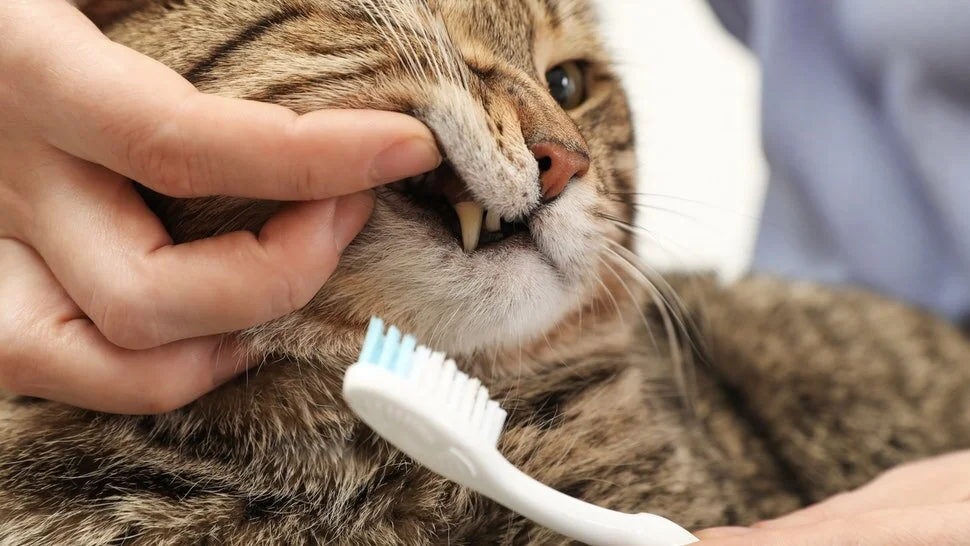Dental disease is a reality for most cats. It’s estimated that nearly 90% of cats will develop dental problems over their lifetime. As soon as the age of four, many cats have significant gingivitis and many also have periodontal disease. What makes it tougher for cat owners is that oftentimes cats won’t show signs of oral discomfort because the pain associated with it comes on slowly over time, and our feline friends just learn to live with it. That’s a sad reality, but it doesn’t have to be this way.
Fresh off the back of our pupdate on Dog Dental Health 101, we’re here to offer a guide to proper oral care for felines with Cat Dental Health 101!
Cat Dental Health 101
Use these steps (and sections of this pupdate) to be a better pet parent and build healthy practices for your cat’s dental health.
Why is feline dental health important?
Pain and inflammation in a cat’s mouth can make it hard for them to eat or drink, and the bacteria can even enter their bloodstream, damaging their kidneys and other vital organs. Domesticated cats don’t get the same opportunities to practice dental health as they would in the wild - chewing bones, grass, or denser foods.
Luckily, poor dental health in cats is largely preventable - but it’s important to be proactive rather than reactive.
Check Your Cat’s Dental Health
Here are some recognizable signs of declining dental health in felines:
Bad breath: an unusually strong odor may suggest digestive problems or a dental condition
Bleeding or a dark red line along the gums
Gum inflammation: swollen gums can lead to gum disease, tooth loss, inability to eat, and can be a sign of kidney disease or feline immunodeficiency virus
Ulcers on the gums
Excessive drooling or pawing at the mouth area
Difficulty chewing food or refusal to eat
If your cat has a tooth problem, it might be some time before you find out, allowing the issue to fester and grow. Cats instinctively hide their pain as a response to not appear vulnerable to predators. If your cat is more hesitant, aggressive, or distant than usual, it could indicate tooth pain.
These are warning signs, some more severe than others. Local veterinarians will be able to provide a full diagnosis and treatment for some or most of these issues with an oral exam, x-rays, and a full cleaning, scaling, and polishing of your cat’s teeth. For our dental health recommendations, drop in to your local Wags to Wiskers Pet Supplies stores in the Ann Arbor, MI area (2270 W. Stadium Blvd, Ann Arbor, MI, 48103) or the Chelsea, MI area (1192 S. Main St, Chelsea, MI, 48118) to speak with a staff member.
Keeping your cat’s teeth clean
The best way to prevent dental issues in your cat is with regular brushing, just like in humans and canines! Here’s a few quick tips to get you and your cat started on the right track.
Get your cat used to the idea of having her teeth brushed. Keep the sessions short and positive. Gently massage her gums with your finger or a cotton swab.
Use a toothbrush designed especially for cats; it’s smaller than a human toothbrush and has softer bristles. Toothbrushes that you can wear over your finger are also available.
Use toothpaste designed for cats; using your own toothpaste can cause distress and upset your cat’s stomach.
If your cat has inflamed gums, brushing her teeth too hard might be painful. Visit the vet for a quick check-up before you begin brushing.
Alternatives to Brushing
Yeah, we get it. Sometimes your “patient” scurries at the mere sight of the toothbrush! Although this isn’t ideal, it doesn’t have to be the end of the road to better dental health.
So, what can you do? Schedule regular professional cleanings with your veterinarian is a good place to start. Furthermore, make sure that what you’re feeding your cat has a focus on oral hygiene. Your cat is a carnivore and needs clean, sharp, strong teeth to get through their food. Wags to Wiskers Pet Supplies carries a number of cat foods that contain fiber to reduce plaque and tartar build-up, unique kibble technology for clean teeth and fresh breath, and other essential nutrients to your cat’s overall health.
Last and certainly not least, your local Wags to Wiskers Pet Supplies stores in the Ann Arbor, MI area (2270 W. Stadium Blvd, Ann Arbor, MI, 48103) or the Chelsea, MI area (1192 S. Main St, Chelsea, MI, 48118) also carry dental toys, supplements, oral gels and sprays, and more because your cat’s dental health is important to us! If your cat is having issues, we can help!




